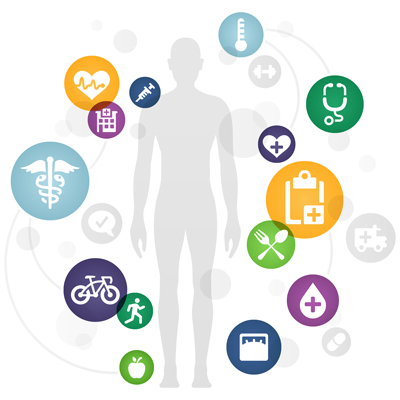 This module aims to develop the student’s understanding of personalised and individualised nutrition as an approach to the prevention and management of functional imbalances and chronic disease. Scientific research continues to emerge on the potentially devastating effects of inappropriate nutrition, environmental toxins and lifestyle factors on a wide range of issues relating to human health throughout life. Nutrigenomics also links nutrition to the genetic expression of health and illness. Increasingly scientific discovery unfolds a genetic basis to a range of chronic degenerative disease afflicting the Western world. Students will develop an understanding of complexity in health and explore nutritional intervention strategies to support optimal function and health aging while taking into account social, cultural and ethical factors influencing an individual’s health and wellbeing.
This module aims to develop the student’s understanding of personalised and individualised nutrition as an approach to the prevention and management of functional imbalances and chronic disease. Scientific research continues to emerge on the potentially devastating effects of inappropriate nutrition, environmental toxins and lifestyle factors on a wide range of issues relating to human health throughout life. Nutrigenomics also links nutrition to the genetic expression of health and illness. Increasingly scientific discovery unfolds a genetic basis to a range of chronic degenerative disease afflicting the Western world. Students will develop an understanding of complexity in health and explore nutritional intervention strategies to support optimal function and health aging while taking into account social, cultural and ethical factors influencing an individual’s health and wellbeing.
- Module Leader: Fiona Ambrose
- Module Leader: Lara Boyd
- Module Leader: Rachel Garnett
 The individual’s responsibility for taking charge of their own health is a growing concept as is the development of corporate and community health culture. This module aims to explore the changes in individual responsibility for health over the past century, at present and what the future might bring. In the context of individual responsibility for health the module will explore inequalities in health care provision and the ability of individuals to assume such responsibility for their health. Students will analyse data, theorise and evaluate cultural drivers and barriers to change as well as critically and reflexively review their own leadership ideas and business practices to inform the design of engaging, ethical and sustainable change management interventions across a range of healthcare business environments.
The individual’s responsibility for taking charge of their own health is a growing concept as is the development of corporate and community health culture. This module aims to explore the changes in individual responsibility for health over the past century, at present and what the future might bring. In the context of individual responsibility for health the module will explore inequalities in health care provision and the ability of individuals to assume such responsibility for their health. Students will analyse data, theorise and evaluate cultural drivers and barriers to change as well as critically and reflexively review their own leadership ideas and business practices to inform the design of engaging, ethical and sustainable change management interventions across a range of healthcare business environments.
- Module Leader: Sian Jeffery
 This module aims to consolidate the development of professional skills in preparation for the workplace and to increase awareness of the context of nutrition in the workplace, which may be varied and controversial. Through development of a thorough understanding of the health and nutrition workplace environments, including corporate, clinical practice and community-based projects within local, national and international environments, the module will provide opportunities for students to evaluate the actions required to attain their professional goals. This will be supported through the generation of a professional portfolio to demonstrate a range of experiences, competencies and skills in preparation for the workplace and via formulation of a network of contacts and work opportunities to enhance career options.
This module aims to consolidate the development of professional skills in preparation for the workplace and to increase awareness of the context of nutrition in the workplace, which may be varied and controversial. Through development of a thorough understanding of the health and nutrition workplace environments, including corporate, clinical practice and community-based projects within local, national and international environments, the module will provide opportunities for students to evaluate the actions required to attain their professional goals. This will be supported through the generation of a professional portfolio to demonstrate a range of experiences, competencies and skills in preparation for the workplace and via formulation of a network of contacts and work opportunities to enhance career options.
- Module Leader: Satu Jackson
- Module Leader: Tiffany Smith
 This module develops from CNS/D 513 Research Methods in providing the opportunity for students to progress from concepts and planning of scientific research including ethical and resourcing issues to the execution of a piece of novel research in the form of an individual project undertaken over the course of the year. Students are expected to produce an account of their project written in the style, format and discipline compatible with published work as found in a peer reviewed scientific journal. Working within an appropriate epistemology, students are welcome to research in areas that are practical or theoretical, experimental or literature based, qualitative or quantitative, objective or phenomenological. Students must seek ethical approval for their project if it involves human participants or human data before commencing their research.
This module develops from CNS/D 513 Research Methods in providing the opportunity for students to progress from concepts and planning of scientific research including ethical and resourcing issues to the execution of a piece of novel research in the form of an individual project undertaken over the course of the year. Students are expected to produce an account of their project written in the style, format and discipline compatible with published work as found in a peer reviewed scientific journal. Working within an appropriate epistemology, students are welcome to research in areas that are practical or theoretical, experimental or literature based, qualitative or quantitative, objective or phenomenological. Students must seek ethical approval for their project if it involves human participants or human data before commencing their research.
- Module Leader: Indrani Saha
- Module Leader: Karin Seidler
 Nutrition intersects with many different professions and sectors. These intersections present an array of contemporary nutrition and health issues, including how physiological, political, economic, technical, business, societal, and regulatory factors operate within an ethical framework integrate to drive, and influence these debates. contemporary issues and debates that shape the global nutrition sector. Students are encouraged to engage with the critical debate of issues which impact on the nutrition profession to more fully understand how they might develop and enhance their own skills and knowledge to contribute to the development and enhancement of the nutrition profession at different levels.
Nutrition intersects with many different professions and sectors. These intersections present an array of contemporary nutrition and health issues, including how physiological, political, economic, technical, business, societal, and regulatory factors operate within an ethical framework integrate to drive, and influence these debates. contemporary issues and debates that shape the global nutrition sector. Students are encouraged to engage with the critical debate of issues which impact on the nutrition profession to more fully understand how they might develop and enhance their own skills and knowledge to contribute to the development and enhancement of the nutrition profession at different levels.
- Module Leader: Fiona Ambrose
- Module Leader: David Titman
 Journal Club is open to all students on the MSc in Personalised Nutrition and to all Level 6 from the BSc Nutritional Science. We will normally run two time-slots for each Journal Club. Allow 1 hr 30 mins for each journal club session.
Journal Club is open to all students on the MSc in Personalised Nutrition and to all Level 6 from the BSc Nutritional Science. We will normally run two time-slots for each Journal Club. Allow 1 hr 30 mins for each journal club session.
The benefit and usefulness of the Journal Clubs for everyone depends on each student making the effort to prepare for the session and contributing to the discussion.
The purpose of these sessions is to give you the opportunity to practice critical analysis of papers, familiarising yourselves with completing checklists and sharing ideas/conclusions with your peer group
- Resource Administrator: Indrani Saha

